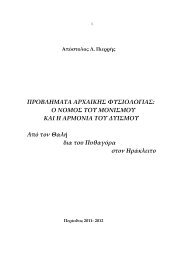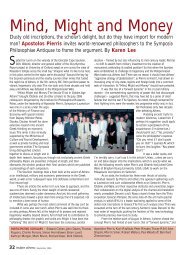14<strong>the</strong> fashi<strong>on</strong> <strong>of</strong> its <strong>on</strong>e-ness, i.e. in an absolutely simple way; hence no moments canbe distinguished in it.But if we now correct <strong>the</strong> formulati<strong>on</strong> <strong>of</strong> <strong>the</strong> said objecti<strong>on</strong>, in accordance with<strong>the</strong> true state <strong>of</strong> affairs, and say that <strong>the</strong> One, if it is πάντα at all, it is so by its very,absolutely simple, nature ( qua c<strong>on</strong>sidered as <strong>the</strong> cause <strong>of</strong> πάντα), implying <strong>the</strong>re bythat it is fit for <strong>the</strong> positi<strong>on</strong> <strong>of</strong> <strong>the</strong> absolutely first principle – if we say this, again weerr, because <strong>the</strong> absolutely first principle must be superior (bey<strong>on</strong>d) even <strong>of</strong> that allpregnantabsolute simplicity which is <strong>the</strong> One [31].4.1. I indicated, with uncertainty, a lacuna, for two reas<strong>on</strong>s:a) The flow <strong>of</strong> <strong>the</strong> passage seems to me being impaired. Without a lacuna wemust understand “if some<strong>on</strong>e says this, firstly he posits in <strong>the</strong> One a distincti<strong>on</strong>,whereas it is we who divide and are doubled and multiplied c<strong>on</strong>cerning its simplicity”.But if so, <strong>the</strong> natural phrasing would be πρῶτον μὲν διπλ. ἐν αὐτῷ θήσεται, ἡμῶνὄντων των μεριζόντων etc., or something similar.b) The μὲν in 3.17 is not co-ordinated to <strong>the</strong> δὲ <strong>of</strong> 4.1 – ra<strong>the</strong>r <strong>the</strong> phrase towhich δὲ bel<strong>on</strong>gs answers what is said in <strong>the</strong> sentence including μὲν. Fur<strong>the</strong>r <strong>the</strong> πρῶτον in 3.17 cannot be matched with ἡμεῖς δὲ etc., as if this latter sentence was asec<strong>on</strong>d reas<strong>on</strong> against <strong>the</strong> objector’s formulati<strong>on</strong>.(b) is ra<strong>the</strong>r weak. For πρῶτον μὲν can be taken as c<strong>on</strong>ti nued in εἰ δὲ καὶ τοῦτο etc. 4.3, which really, according to my interpretati<strong>on</strong> above, represents <strong>the</strong>reformulati<strong>on</strong> <strong>of</strong> <strong>the</strong> objecti<strong>on</strong> in order to meet what was urged against it in its firstand original formulati<strong>on</strong>. (a) is str<strong>on</strong>ger but not c<strong>on</strong>clusive ei<strong>the</strong>r , given <strong>the</strong>idiosyncratic, hypomnematic manner <strong>of</strong> D.’s writing.If <strong>the</strong>re is a lacuna, <strong>the</strong>n ei<strong>the</strong>r <strong>the</strong> suggesti<strong>on</strong> <strong>of</strong> c<strong>on</strong>sidering εἰ δὲ καὶ τοῦτοetc. (4.3) as answering to πρῶτον μὲν is correct, in which case <strong>the</strong> lacuna would beshort (something like ἡμεῖς δὲ etc.); or we must expect asec<strong>on</strong>d reas<strong>on</strong> (which <strong>on</strong>e?) against <strong>the</strong> first formulati<strong>on</strong>, in which case <strong>the</strong> lacunawould be l<strong>on</strong>ger.4.4-5. I think « αὐτῶν τῶν πάντων» refers to πάντα as a divided totality(which is <strong>the</strong> comm<strong>on</strong> noti<strong>on</strong> v . 3.8); « ἁπλουστάτης παντότητος» may refer to <strong>the</strong>ἡνωμένον, <strong>the</strong> United; « τῆς πάντα καταπιούσης ἁπλότητος» would <strong>the</strong>n signify <strong>the</strong>One. I suggest this, in order to capture <strong>the</strong> subtle difference (really trivial for a
15Neoplat<strong>on</strong>ist worth his name ) between ἁπλουστάτη παντότης <strong>on</strong> <strong>the</strong> <strong>on</strong>e hand,and πάντα καταπιοῦσα ἁπλότης <strong>on</strong> <strong>the</strong> o<strong>the</strong>r.4.6-10. This represents t he formal statement <strong>of</strong> D. ’s main <strong>the</strong>sis in <strong>the</strong> firstsecti<strong>on</strong> <strong>of</strong> his work. Such a doctrine can, <strong>of</strong> course, <strong>on</strong>ly be divined (μαντεύεται) byour soul, and this again <strong>on</strong>ly if she exerted herself to <strong>the</strong> uttermost <strong>of</strong> her powers.The absolutely ultimate ground <strong>of</strong> <strong>the</strong> Universe must have no co-ordinati<strong>on</strong>whatever, however slight, however indirect with <strong>the</strong> Universe <strong>of</strong> Realityitself [32].But if so, <strong>the</strong>n it cannot be even principle or cause; for every principle andcause qua principle and cause [33] is a principle and cause <strong>of</strong> something, and in thisway c<strong>on</strong>nected and co-ordinated with that <strong>of</strong> which it is a principle and cause. Andsimilarly, <strong>the</strong> Absolute Ground cannot be “first” reality, or before everything orbey<strong>on</strong>d everything – let al<strong>on</strong>e be everything in whatever way . All <strong>the</strong>se appellati<strong>on</strong>spresuppose some c<strong>on</strong>taminati<strong>on</strong> <strong>of</strong> <strong>the</strong> Ultimate Principle effected through its beingbrought into a certain kind <strong>of</strong> relati<strong>on</strong>ship with what follows it [ 34]. In short <strong>the</strong>genuinely Absolute Ultimate Principle and Ground cannot be absolute orUltimate or Principle or Ground. C<strong>on</strong>sequently, it can by no means be praised, orc<strong>on</strong>ceived or surmised.4.10-5.2. There follows an analysis <strong>of</strong> th e last point, which leads, via aprotestati<strong>on</strong> against positing something above <strong>the</strong> One (5.2-5.14), to <strong>the</strong> directargumentati<strong>on</strong> (5.14-9.10) in favour <strong>of</strong> <strong>the</strong> main <strong>the</strong>sis.4.10. ἐννοεῖν = c<strong>on</strong>ceive.ὑπονοεῖν = sub-c<strong>on</strong>ceive, c<strong>on</strong>ceive indirectly and after a fashi<strong>on</strong>.ἐπινοεῖν may have something <strong>of</strong> <strong>the</strong> flavor <strong>of</strong> “inve nt”, i.e. c<strong>on</strong>structmentally, in which sense it may form a fitting c<strong>on</strong>trast to νοεῖν, meant here broadly,= think <strong>of</strong> directly [35]. But mainly, I think, it c<strong>on</strong>veys <strong>the</strong> sense “c<strong>on</strong>ceiveadditi<strong>on</strong>ally to something (already c<strong>on</strong>ceived)”, as if applying to a sec<strong>on</strong>d orderc<strong>on</strong>cepti<strong>on</strong>, or <strong>the</strong> c<strong>on</strong>cepti<strong>on</strong> <strong>of</strong> a feature <strong>of</strong> something already c<strong>on</strong>ceived in aprimary c<strong>on</strong>cepti<strong>on</strong>. Cf. similar c<strong>on</strong>structi<strong>on</strong>s , like ἐπιγιγνόμενον τέλος (Aristotle),ἐπιφαινόμενον etc.Anything that we can c<strong>on</strong>ceive is, strictly speaking ( καὶ τοῦτό γεἀληθέστερον), something determinate; to a definite c<strong>on</strong>cepti<strong>on</strong> corresp<strong>on</strong>ds adeterminate c<strong>on</strong>tent – however abstrac this c<strong>on</strong>tent and <strong>the</strong> c<strong>on</strong>cept “intending”
- Page 2 and 3: 2GENERAL REMARKThe first section is
- Page 4 and 5: 4Four reasons are, in aporematic fa
- Page 6 and 7: 6ὐθύς, i.e. without any prior
- Page 8 and 9: 8ἀμερές). Thus nothing is mi
- Page 10 and 11: 10separate them. Basically, as Aris
- Page 12 and 13: 12produced by, it; the principle in
- Page 16 and 17: 16[36] it may be. Now the def inite
- Page 18 and 19: 18found, and (there found) in accor
- Page 20 and 21: 20in its elf (apart from the orderi
- Page 22 and 23: 22something whose immediate product
- Page 24 and 25: 24clearer, as the system is further
- Page 26 and 27: 26ἡνωμένον, which generate
- Page 28 and 29: 28We find in this here a good insta
- Page 30 and 31: 30fully see his point, and to take,
- Page 32 and 33: 32NOTES[1] Not quite “given” th
- Page 34 and 35: 34forget that, for the time being,
- Page 36 and 37: 36[28] The interpretation given to
- Page 38 and 39: 38[39] It can be shown that there c
- Page 40 and 41: 40being immersed in it, handling it










